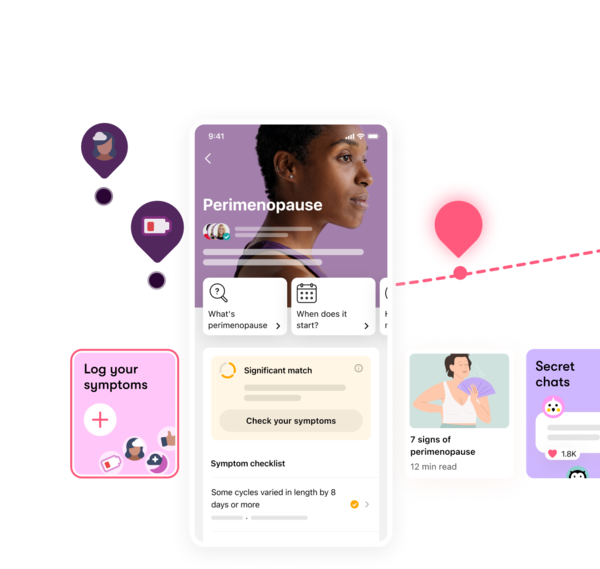-
Tracking cycle
-
Getting pregnant
-
Pregnancy
-
Help Center
-
Flo for Partners
-
Anonymous Mode
-
Flo app reviews
-
Flo Premium New
-
Secret Chats New
-
Symptom Checker New
-
Your cycle
-
Health 360°
-
Getting pregnant
-
Pregnancy
-
Being a mom
-
LGBTQ+
-
Quizzes
-
Ovulation calculator
-
hCG calculator
-
Pregnancy test calculator
-
Menstrual cycle calculator
-
Period calculator
-
Implantation calculator
-
Pregnancy weeks to months calculator
-
Pregnancy due date calculator
-
IVF and FET due date calculator
-
Due date calculator by ultrasound
-
Medical Affairs
-
Science & Research
-
Pass It On Project New
-
Privacy Portal
-
Press Center
-
Flo Accuracy
-
Careers
-
Contact Us
Birth control for perimenopause: What you should know


Every piece of content at Flo Health adheres to the highest editorial standards for language, style, and medical accuracy. To learn what we do to deliver the best health and lifestyle insights to you, check out our content review principles.
Birth control might not seem like a priority in your 40s and 50s. But there are two important reasons to think about contraception during perimenopause. Let’s find out more.
If you’re in your 40s or 50s, then you’d be forgiven for assuming that using birth control is a thing of the past. After all, sex education classes have led lots of us to believe that you can’t get pregnant after 40 without the help of fertility treatment. But that’s not always the case.
Research shows that pregnancy is still possible during perimenopause (the years leading up to menopause), even though your fertility does start to decline after the age of 35. And there’s another important reason to think about contraception.
Combined oral contraceptive pills have been found to act like hormone therapy (HT, also known as hormone replacement therapy or HRT), so they can be used by some people to help with perimenopause symptoms like hot flashes, irregular periods, and mood swings.
Let’s get the expert lowdown on birth control for perimenopause — from the type that may be best for you to when to stop taking it.
Key takeaways:
- During perimenopause, you still have a chance of getting pregnant every cycle.
- Even if your periods are irregular, it’s possible to ovulate (when your ovary releases an egg), which means you can still get pregnant.
- To avoid an unplanned pregnancy, you will need to use contraception until you have officially reached menopause (12 months after your last period).
- Combination oral hormonal contraceptives may also help to relieve hormone-related perimenopausal symptoms, such as hot flashes and mood swings.
Why take birth control during perimenopause?

Before we dive into the best birth control for perimenopause, let’s clear up any confusion about what perimenopause actually means. Perimenopause is the years leading up to menopause (your final period). It can begin somewhere between your late 30s and 50s, most often in your 40s. You might experience symptoms like hot flashes, brain fog, and mood swings during perimenopause.
You’re then officially diagnosed as having hit menopause when you haven’t had a period for 12 months (usually between the ages of 45 and 55). It’s a retrospective diagnosis, which basically means the diagnosis happens after the event. From that point on, you are postmenopausal. You don’t need to use contraception to avoid pregnancy anymore, but you might still want to take the pill to help with symptoms. Remember too that you can still catch sexually transmitted infections, so using condoms is still important.
There are two main reasons why you might consider taking birth control during perimenopause:
Preventing unplanned pregnancy
If you’re not planning on getting pregnant, then it’s important to use contraception. You might think that if your periods have become more irregular or you’ve started to notice some symptoms associated with perimenopause, then this doesn’t apply to you, but it does.
“Most women at this time still ovulate, although ovulation may be irregular and may involve more than one egg per cycle,” says Dr. Ruth Olumba, obstetrician, gynecologist, and gynecologic and cosmetic surgeon, Texas, US. “Without a form of birth control, women can get pregnant as long as they are ovulating, even during perimenopause, although their fertility rate is lower.”
Managing perimenopausal symptoms
Hot flashes, mood swings, and irregular periods can be hard to navigate during perimenopause, but the good news is that you don’t have to put up with them. Taking birth control can help.
“Combination oral hormonal contraceptives that include both estrogen and progestin are useful as both birth control and to manage symptoms of perimenopause,” Dr. Olumba explains.
Why? Well, hot flashes and mood swings are known as vasomotor symptoms. These are thought to be caused by fluctuations in your hormones, specifically estrogen. Like HT, the combined pill works by regulating your hormone levels, so those annoying perimenopause side effects should ease off if you only need a low dose.
"Without a form of birth control, women can get pregnant as long as they are ovulating, even during perimenopause"
The best contraceptive for perimenopause
The best contraception for perimenopause really depends on the person taking it. We are all different, and certain types of birth control may suit you better than others.
Contraceptive pill
While there are lots of different brands of contraceptive pills, they can be split into two main types:
Combined oral contraceptive pill
The combined oral contraceptive pill (COCP) includes both of the hormones estrogen and progestin (the synthetic version of progesterone). You might consider taking the COCP instead of HT to help regulate your periods and relieve perimenopause symptoms.
However, not everyone can take COCP. This is because estrogen-based contraceptives can slightly increase the risk of some medical conditions (including breast cancer and blood clots). Your doctor will ask you about your family and medical history before prescribing it. They’ll also consider age and some lifestyle factors, like weight and whether you smoke.
Progestin-only pill
As the name suggests, the progestin-only pill (POP or the mini pill) only contains progestin. It suits some people better than other birth control options, as it has fewer associated risks and can also help to regulate heavy and painful periods. If you take POPs, your periods might become irregular or stop altogether. However, “Progestin-only birth control, although effective in preventing pregnancy, will not offer the additional benefit of perimenopause symptom prevention or therapy,” says Dr. Olumba. This is because it doesn’t contain estrogen.
Take a quiz
Find out what you can do with our Health Assistant
Contraceptive injection
The contraceptive injection is a good option if you get heavy periods or frequently forget to take a daily pill. When you’re busy, it can be hard to remember. It lasts eight or 13 weeks depending on the type of injection you have. While some types of contraceptive injection release only the hormone progestin into your bloodstream to prevent pregnancy, they don’t have the benefits of soothing estrogen-related symptoms — something to think about.
Contraceptive implant
The contraceptive implant is a small plastic rod that is inserted under the skin in your upper arm. It contains progestin and works by pausing ovulation. It may help with heavy, painful periods, but because there’s no estrogen, it won’t relieve vasomotor symptoms.
Barrier methods
Barrier contraceptive methods include male (external) condoms, female (internal) condoms, diaphragms, and cervical caps. You can use these forms of birth control on their own or alongside others. They’re the only contraception that reduces your risk of unplanned pregnancy and catching/spreading sexually transmitted infections. But they’re nonhormonal so won’t help manage hot flashes or mood swings.
IUDs
An intrauterine device (IUD) or coil is a small, T-shaped device that is inserted through your cervix and placed inside your uterus to prevent unplanned pregnancy. You might have heard IUDs referred to as long-acting reversible contraception. This means that you can have the IUD inserted and then don’t need to think about it. There are two different types of IUDs to choose from:
Copper IUD
The copper IUD is a nonhormonal device that releases copper to stop you from getting pregnant. You can have a copper IUD for up to 10 years, which means it’s a great option if you don’t want to switch up your birth control method for a while. However, since they don’t have any hormones, they won’t have any HT impact, and you might end up with heavier periods.
Hormonal IUD
Like the copper IUD, a hormonal IUD is inserted into your uterus. These release progestin to stop ovulation and protect you from unplanned pregnancy. If you have heavy or irregular periods, then your doctor might recommend a hormonal coil. Don’t be fooled by the name. These IUDs are estrogen-free, so won’t help with vasomotor symptoms alone, but can be used with estrogen as HT. If you combine birth control alongside HT, it’s always a good idea to talk to your doctor about any side effects or risks.
When to stop taking contraception
Choosing when you might want to stop taking contraception is just as personal as picking the right type for you. There’s no one-size-fits-all answer. It’s totally dependent on what you need and if you’re experiencing symptoms associated with perimenopause. Generally speaking, if you’re otherwise healthy and have passed menopause, your doctor may recommend that you stop taking birth control after the age of 55.
If you’re thinking about stopping birth control, then your first step should be a conversation with your doctor. This is especially important if you think you might be postmenopausal. “When a woman is no longer ovulating, there is a decision to be made as to whether to go off birth control and transition in an immediate or delayed fashion to hormone replacement therapy if desired,” Dr. Olumba says.
More FAQs
What is the average age of perimenopause?
The average age of perimenopause is 40. It usually begins about four to eight years before menopause. People become perimenopausal at different ages, but it’s considered normal to start anywhere between your late 30s and 50s.
Can I stay on birth control pills until menopause?
Many people decide to stay on birth control up until menopause, and it’s perfectly OK to do so.
However, the same birth control methods you used when you were in your 20s and 30s may not suit you in your 40s. Your health and lifestyle change over your lifetime, so it’s worth having a conversation with your doctor.
Generally, if you’re otherwise healthy and have passed menopause, your doctor may recommend that you stop taking birth control after the age of 55.
Can birth control pills make perimenopause symptoms worse?
If you’re taking birth control but think it might be making your perimenopause symptoms worse or causing new symptoms, then talk to your health care provider. They can help you find an alternative option.


Hey, I'm Anique
I started using Flo app to track my period and ovulation because we wanted to have a baby.


The Flo app helped me learn about my body and spot ovulation signs during our conception journey.


I vividly
remember the day
that we switched
Flo into
Pregnancy Mode — it was
such a special
moment.
Real stories, real results
Learn how the Flo app became an amazing cheerleader for us on our conception journey.
References
“A Guide to Birth Control in Your 40s and 50s.” Cleveland Clinic, 10 May 2023, health.clevelandclinic.org/birth-control-during-perimenopause.
“Advanced Maternal Age.” Cleveland Clinic, my.clevelandclinic.org/health/diseases/22438-advanced-maternal-age/. Accessed 8 Feb. 2024.
“Barrier Methods of Birth Control: Spermicide, Condom, Sponge, Diaphragm, and Cervical Cap.” The American College of Obstetricians and Gynecologists, Apr. 2022, www.acog.org/womens-health/faqs/barrier-methods-of-birth-control-spermicide-condom-sponge-diaphragm-and-cervical-cap.
Burkman, Ronald T. “Perimenopause.” Obstetrics and Gynecology Clinics of North America, vol. 29, no. 3, Sep. 2002, pp. xi – xii, https://doi.org/10.1016/S0889-8545(02)00018-9.
Cho, Moon Kyoung. “Use of Combined Oral Contraceptives in Perimenopausal Women.” Chonnam Medical Journal, vol. 54, no. 3, Sep. 2018, pp. 153–58, https://doi.org/10.4068%2Fcmj.2018.54.3.153.
“Contraceptive Implant.” Mayo Clinic, 24 Mar. 2023, www.mayoclinic.org/tests-procedures/contraceptive-implant/about/pac-20393619.
Deecher, D. C., and K. Dorries. “Understanding the Pathophysiology of Vasomotor Symptoms (Hot Flushes and Night Sweats) That Occur in Perimenopause, Menopause, and Postmenopause Life Stages.” Archives of Women’s Mental Health, vol. 10, no. 6, Dec. 2007, pp. 247–57, https://doi.org/10.1007/s00737-007-0209-5.
Distler, W. “Postmenopause.” Gynäkologe, vol. 36, no. 181, Mar. 2003, https://doi.org/10.1007/s00129-003-1350-5.
Grandi, Giovanni, et al. “Contraception during Perimenopause: Practical Guidance.” International Journal of Women’s Health, vol. 14, July 2022, pp. 913–29, https://doi.org/10.2147%2FIJWH.S288070.
Greendale, G. A., et al. “The Menopause.” The Lancet, vol. 353, no. 9152, Feb. 1999, pp. 571–80, https://doi.org/10.1016/s0140-6736(98)05352-5.
“LARC (Long-Acting Reversible Contraceptive): Overview.” Cleveland Clinic, my.clevelandclinic.org/health/treatments/23269-larc. Accessed 8 Feb. 2024.
“Minipill (Progestin-Only Birth Control Pill).” Mayo Clinic, 13 Jan. 2023, www.mayoclinic.org/tests-procedures/minipill/about/pac-20388306.
“Perimenopause.” Mayo Clinic, 25 May 2023, www.mayoclinic.org/diseases-conditions/perimenopause/symptoms-causes/syc-20354666.
“Menopause 101: A Primer for the Perimenopausal.” The North American Menopause Society, www.menopause.org/for-women/menopauseflashes/menopause-symptoms-and-treatments/menopause-101-a-primer-for-the-perimenopausal. Accessed 8 Feb. 2024.
“Progestin-Only Hormonal Birth Control: Pill and Injection.” The American College of Obstetricians and Gynecologists, Jan. 2023, www.acog.org/womens-health/faqs/progestin-only-hormonal-birth-control-pill-and-injection.
History of updates
Current version (15 February 2024)
Published (15 February 2024)
In this article

Track your perimenopause journey in the Flo app
-
Log symptoms and get tips to manage them
-
Learn what to expect with expert-led articles and videos
-
Connect with others who can relate to how you're feeling




